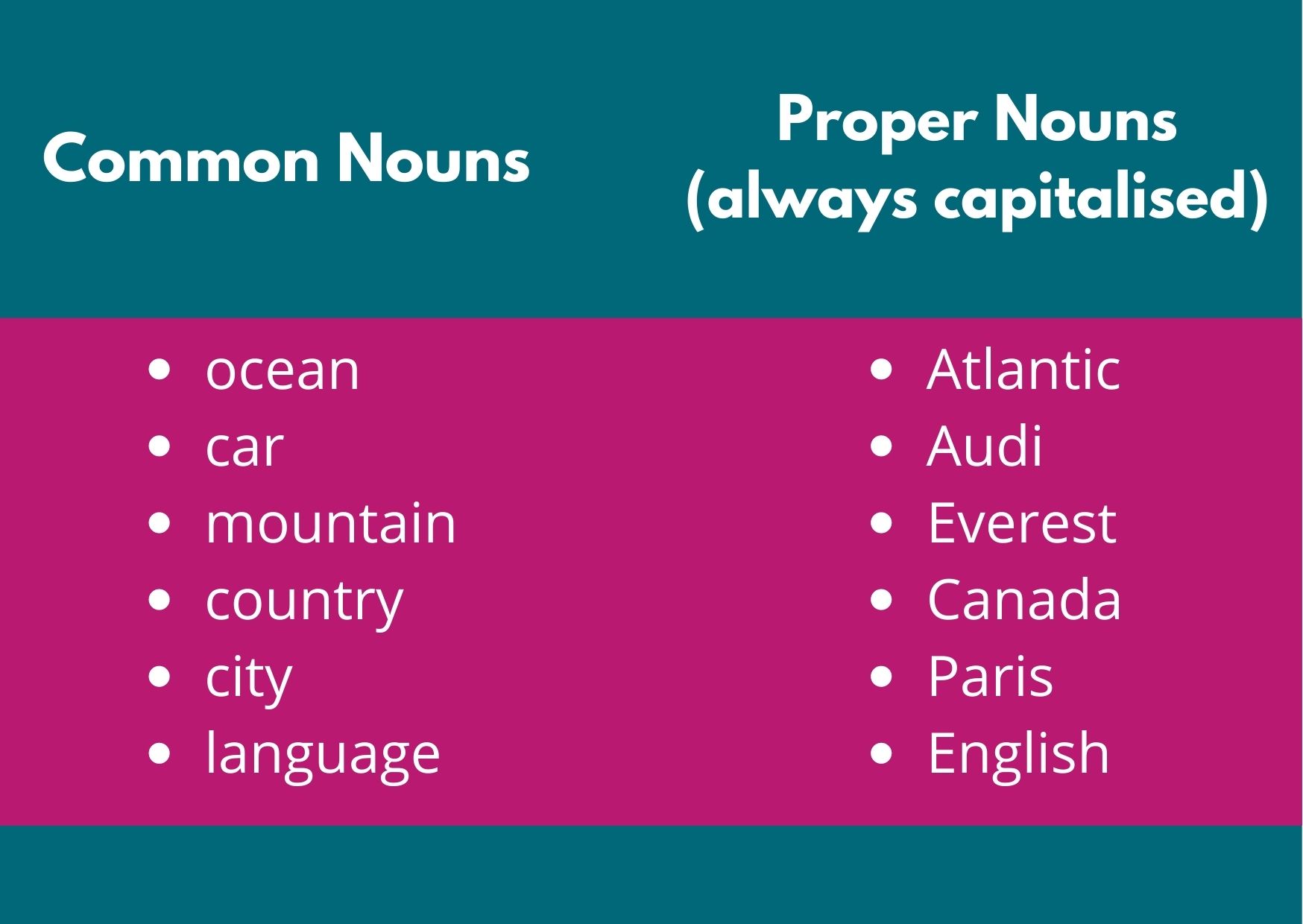A proper noun is a distinct (not general) name for a distinct person, place, or thing. When writing in English, proper nouns are capitalized all the time, no matter where you happen to see them in a sentence. Because they supply nouns with a distinct name, they will often be referred to as proper names.
All nouns can be grouped into either common or proper. A common noun is a general name for one item in a class or category.
Example: park, boy, movie
Proper nouns, however, name a noun specifically.
Example: Central Park, Joshua, The Green Mile
In the sentences below, proper noun examples are compared with common nouns. As you can see, the proper nouns are specific and unique, while the common nouns are much more general in nature.
- Common noun: I want to be a painter.
- Proper noun: Pablo Picasso was a prolific painter.
- Common noun: The kids would like to adopt a dog
- Proper noun: Snowy is the cutest puppy ever.
- Common noun: Would you like some cereal?
- Proper noun: I’m craving Froot Loops.
- Common noun: Let’s drive to the city.
- Proper noun: Let’s go to New York.
- Common noun: My teacher begins work before the students arrive.
- Proper noun: Mr. Bell is passionate about education.
- Common noun: I think that’s a planet, not a star.
- Proper noun: I can see Venus at dawn.
- Common noun: She is always hanging out with her boyfriend.
- Proper noun: She never goes anywhere without Peter.
- Common noun: The archives contain many important documents.
- Proper noun: The Library of Congress houses many important documents
It is usually very simple to see the difference between common and proper nouns, although sometimes, they can be harder to decipher. When speaking, it does not matter if a noun is proper or common because it doesn’t influence or change the sentence structure. In writing though, it is important to understand which nouns are proper so we know where to put capitalization.
The overuse of capitalization is the most frequently made spelling error there is. Subconsciously, we want to use capitalization to stress importance when writing. Marketing and sales representatives will capitalize abundantly When They Want To Attract Attention To A Product Or Service, but this is not a good habit to pick up in your writing.
To increase the clarity and legibility of your writing, be careful to only capitalize proper nouns. Extra capital letters are unnecessary hurdles to clear through your sentences.
These are some samples of common and proper nouns that are frequently capitalized inappropriately.
Is it Mom or mom? Nouns That Indicate Family Relationships
The nouns we use when referring to our families can present some problems. A general guideline is that when using words like dad, mom, or uncle, you should only capitalize the word if it’s being used in the same way as if you were addressing them personally and using their name. If the word isn’t being used in place of their name, then it is not capitalized. This does not affect the word’s significance, however.
Example:
Please tell Dad we are on our way.
Does your dad need a ride to the restaurant?
Even if the speaker of the last sentence is familiar with your dad and is thinking of him specifically, dad is not being used as a proper name, so it does not need to be capitalized.
Incorrect: Carrie told her Aunt she could stay for dinner.
Correct: Carrie told her aunt she could stay for dinner.
Do Directions Get Capitalized?
Directions on a compass won’t get capitalized unless they describe the proper name of a place.
Example:
We took the highway and drove north until we got there.
We took the highway and drove to North Dakota
Are Seasons Capitalized?
People sometimes think they should capitalize the four seasons because we capitalize months of the year and days of the week but this is untrue. Seasons should only be capitalized when they are part of a proper name.
Incorrect: I love going to New York in the Winter.
Correct: I love going to New York in the winter.
Correct: I need to find a dress for the Winter Formal.
Related: Learn more about capitalisation of Heading and Titles
Job Titles
It is very hard to fight the urge to capitalize job titles, but once again, unless they are used as part of someone’s name, do not capitalize them.
Example:
You must meet our project manager, James Stewart
Today our meeting was with Project Manager James Stewart.
No matter how important the job title seems, you should not capitalize the title if it does not name him or her.
Example:
Next time I’m in Washington DC, I hope to meet the president.
I can’t wait to meet President Biden when I go to Washington DC next year.
Brand Names
When brand names are used frequently in conversation, it is hard to remember to capitalize them but they are in fact, proper names.
Example:
She asked her mom for a cotton swab for her ears.
May I please have a Q-tip?
Eponyms
Some nouns that are named after the person who discovered them or a region they were discovered—eponyms—become so commonly used that it is no longer necessary to capitalize them. For example, Rudolf Christian Karl Diesel, a German inventor and mechanical engineer, became famous for the invention of the diesel engine.
Correct: Does your truck take gasoline or diesel?
There will be many times when you see a word and have to decide whether it is a common or proper noun before you can know if you should capitalize it or not. When you aren’t sure, do what I do and look it up.
Here is a little graphic to help summarise the relationship between common and proper nouns:

—
Want to sharpen your business writing skills? Discover our acclaimed online courses at syntaxtraining.com






